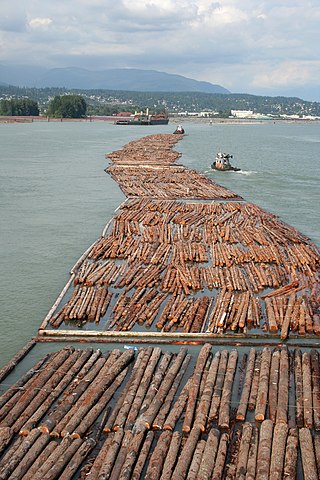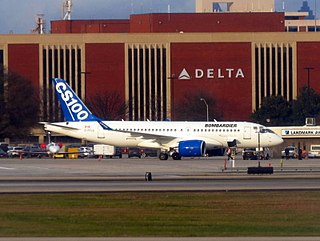
The Trade Expansion Act of 1962 is an American trade law.

The Federal Trade Commission (FTC) is an independent agency of the United States government whose principal mission is the enforcement of civil (non-criminal) antitrust law and the promotion of consumer protection. The FTC shares jurisdiction over federal civil antitrust law enforcement with the Department of Justice Antitrust Division. The agency is headquartered in the Federal Trade Commission Building in Washington, DC.
In the United States government, independent agencies are agencies that exist outside the federal executive departments and the Executive Office of the President. In a narrower sense, the term refers only to those independent agencies that, while considered part of the executive branch, have regulatory or rulemaking authority and are insulated from presidential control, usually because the president's power to dismiss the agency head or a member is limited.

The Canada–U.S. softwood lumber dispute is one of the largest and most enduring trade disputes between both nations. This conflict arose in 1982 and its effects are still seen today. British Columbia, the major Canadian exporter of softwood lumber to the United States, was most affected, reporting losses of 9,494 direct and indirect jobs between 2004 and 2009.
On March 5, 2002, U.S. President George W. Bush placed tariffs on imported steel. The tariffs took effect March 20 and were lifted by Bush on December 4, 2003. Research shows that the tariffs were a net positive, reviving many previously shuttered steel factories.

The United States Customs Service was a federal law enforcement agency of the U.S. federal government. Established on July 31, 1789, it collected import tariffs, performed other selected border security duties, as well as conducted criminal investigations.

United States Customs and Border Protection (CBP) is the largest federal law enforcement agency of the United States Department of Homeland Security. It is the country's primary border control organization, charged with regulating and facilitating international trade, collecting import duties, as well as enforcing U.S. regulations, including trade, customs and immigration. CBP is one of the largest law enforcement agencies in the United States. It has a workforce of more than 45,600 federal agents and officers. It is headquartered in Washington, D.C.

The United States Court of International Trade is a U.S. federal court that adjudicates civil actions arising out of U.S. customs and international trade laws. Seated in New York City, it exercises broad jurisdiction over most trade-related matters, and is permitted to hear and decide cases anywhere in the country, as well as abroad.
An administrative law judge (ALJ) in the United States is a judge and trier of fact who both presides over trials and adjudicates claims or disputes involving administrative law. ALJs can administer oaths, take testimony, rule on questions of evidence, and make factual and legal determinations.

The Federal Mine Safety and Health Review Commission is an independent adjudicative agency of the United States government that provides administrative trial and appellate review of legal disputes arising under the Federal Mine Safety and Health Amendments Act, or Mine Act, of 1977.
The United States is considered to have the most favorable legal regime for inventors and patent owners in the world. Under United States law, a patent is a right granted to the inventor of a (1) process, machine, article of manufacture, or composition of matter, (2) that is new, useful, and non-obvious. A patent is the right to exclude others, for a limited time from profiting of a patented technology without the consent of the patent-holder. Specifically, it is the right to exclude others from: making, using, selling, offering for sale, importing, inducing others to infringe, applying for an FDA approval, and/or offering a product specially adapted for practice of the patent.

Motorola Solutions, Inc. is an American video equipment, telecommunications equipment, software, systems and services provider that succeeded Motorola, Inc., following the spinoff of the mobile phone division into Motorola Mobility in 2011. The company is headquartered in Chicago, Illinois.

MStar Semiconductor, Inc. was a Taiwanese fabless semiconductor company specializing in mixed-mode integrated circuit technologies, based in Hsinchu Hsien. MStar made hardware for multimedia and wireless communications, in the form of display ICs and mixed-mode ASIC/IPs, in addition to chip sets for GSM mobile handsets. MStar employed approx. 1300 in more than 10 branches worldwide. The company's revenue was around US$1067 million in 2010. The growth has been substantial, their revenue in 2005 was US$175 million. MStar is listed on the Taiwan Stock Exchange under the code 3697.

Dean Arthur Pinkert is an American trade lawyer.

Suniva is a 100% American owned, U.S. based manufacturer of high-efficiency crystalline silicon photovoltaic (PV) solar cells. Headquartered in metropolitan Atlanta, with a state of the art cell manufacturing facility in Georgia, Suniva had sold its PV products globally.
Motorola Mobility v. Apple Inc. was one of a series of lawsuits between technology companies Motorola Mobility and Apple Inc. In the year before Apple and Samsung began suing each other on most continents, and while Apple and High Tech Computer Corp. (HTC) were already embroiled in a patent fight, Motorola Mobility and Apple started a period of intense patent litigation. The Motorola-Apple patent imbroglio commenced with claims and cross-claims between the companies for patent infringement, and encompassed multiple venues in multiple countries as each party sought friendly forums for litigating its respective claims; the fight also included administrative law rulings as well as United States International Trade Commission (ITC) and European Commission involvement. In April 2012, the controversy centered on whether a FRAND license to a components manufacturer carries over to an equipment manufacturer incorporating the component into equipment, an issue not addressed in the Supreme Court's default analysis using the exhaustion doctrine in Quanta v. LG Electronics. In June 2012, appellate judge Richard Posner dismissed the U.S. case with prejudice and the parties appealed the decision a month later.
Gamevice, Inc. is a Simi Valley, California based tablet and tablet peripherals manufacturer specializing in gaming products.

On 28 April 2016, Bombardier Aerospace recorded a firm order from Delta Air Lines for 75 CSeries CS100s plus 50 options. On 27 April 2017, Boeing filed a petition for dumping them at $19.6m each, below their $33.2m production cost. On the same day, Bombardier and the Canadian Federal Government rejected the claim, vowing to mount a "vigorous defence".
Lucia v. Securities and Exchange Commission, 585 U.S. ___ (2018), was a decision by the Supreme Court of the United States on the status of administrative law judges of the Securities and Exchange Commission. The Court held that they are considered inferior officers of the United States and so are subject to the Appointments Clause and must be appointed through the President or other delegated officer of the United States, rather than hired. As "inferior" officers, their appointments are not subject to the Senate's advice and consent role.
Brooms manufactured from broomcorn became specifically subject to an increase in US import tariffs in 1996. In response to the US action, chief exporter of broomcorn brooms Mexico requested dispute settlement from an arbitration tribunal of NAFTA, which eventually decided in Mexico's favor. It was one of only three cases to be decided under the provisions of Chapter 20 of NAFTA.













